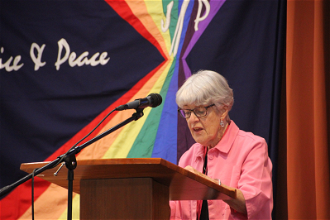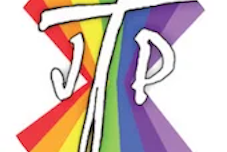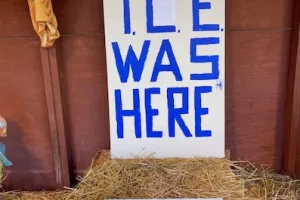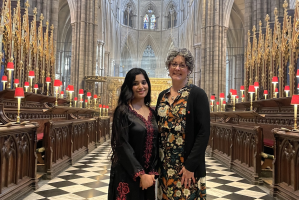NJPN Blog: Seeking Peace - A call to maturity
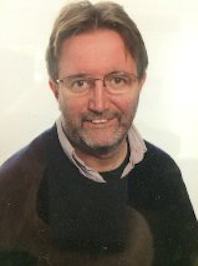
Fr Chris Hughes
In the synoptic versions of the Passion Narrative, the crucifixion of Jesus take place the day after the Passover celebration. In John's Gospel, which we will hear on Good Friday, the Gospel states clearly that his death is on preparation day, the day before the Passover Feast.
This is not the place to consider which account is the historically correct, but we can say for certain that in placing Jesus' death on the preparation day, when Jesus is on the cross, the Passover lambs are being sacrificed for Passover celebration the next day. So, the Gospel is by implication informing us that Jesus is THE Passover Lamb of God, who takes on the violence of the world to ensure that like in the Exodus story of the people of Israel, death 'passes over' them, to ensure their liberation from enslavement. In acknowledging Jesus as our Passover Lamb, we are liberated from sin and death. But our liberation is not achieved by aggressive act, but by the passive acts of his death and resurrection.
The events we celebrate in our Liturgies of Holy Week are the ultimate expression of non-violent resistance. We should not be surprised that the early Church eschewed violence and taking part in military action. Their new-found freedom as children of God united in baptism with a crucified and risen Christ was achieved not by violence.
So, what does the above mean faced with the horrors of the war in the Ukraine. I have not heard anyone state that the Ukrainian people should allow Putin's naked aggression to be unopposed but I can also appreciate the fear of the violence escalating to across the European Continent. The events of recent weeks have validated for me these words of Pope Francis in Fratelli Tutti para 261:
"Every war leaves our world worse than it was before. War is a failure of politics and of humanity, a shameful capitulation, a stinging defeat before the forces of evil. Let us not remain mired in theoretical discussions but touch the wounded flesh of the victims. Let us look once more at all those civilians whose killing was considered "collateral damage". Let us ask the victims themselves. Let us think of the refugees and displaced, those who suffered the effects of atomic radiation or chemical attacks, the mothers who lost their children, and the boys and girls maimed or deprived of their childhood."
I have recently read Delia Smith's published 'You Matter: The Human Solution'. Inspired by the writings of Maslow, Frankl and the Jesuit Teilhard de Chardin, Smith asserts that we all have to take responsibility to develop our maturity, seeking a deep sense of solidarity and unity with each other if the common good and the environment is to be sustained. Smith was clearly inspired by the strong sense of care, dedication and service shown by so many during the pandemic. But seeing the horrors of war and how fellow human can inflict such barbaric and cruel suffering on others, especially on children and the vulnerable, I realise that we still have a lot of growing up to do!
In Patrick's Deneen's thought provoking 'Why Liberalism has failed', he reminds us that the modern sense of liberty, that of avoiding any restraints on our activities, is very different to a Classical and Christian sense of liberty, which is being aware of and shaping our passions and appetites so that we are not enslaved by them. It is these collective unrestrained appetites of our world that is damaging our planet and creating the fierce competition for limited resources, which is the source of so much poverty and violence, creating such a strong 'culture of death'. In John Dear's reflection on the raising of Lazarus in John's Gospel, he sees Jesus confronting this culture of death. The call by Jesus to Lazarus to come out of a place of death and be set free is for us all.
During Holy Week may we attentive to the 'Lamb of God, who takes away the sin of the world'. As we are in solidarity with the people of Ukraine and with all victims of war, may we be free of any insatiable demands we may have and be deeply attentive to the needs and dignity of others, seeking the way of genuine co-operation and not competition. This may seem so insignificant faced with the horrors of war, but is the way of THE Passover Lamb, utterly grounded in the love of Creator, who in his self-giving liberates us from all destructive powers. This is the ultimate source of true peace and the true model for a collective human maturity, which is sadly still much needed.
Chris Hughes is a parish priest at St Cuthbert's and St Joseph's, North Shields in the Diocese of Hexham and Newcastle. He is also co-chair of Tyne and Wear Citizens and a member of Church Action on Poverty North East.
The Annual Conference of the National Justice and Peace Network (NJPN) 22-24 July 2022 takes the theme, 'Hope is a verb with its sleeves rolled up'. Booking now at: www.justice-and-peace.org.uk/conference/




